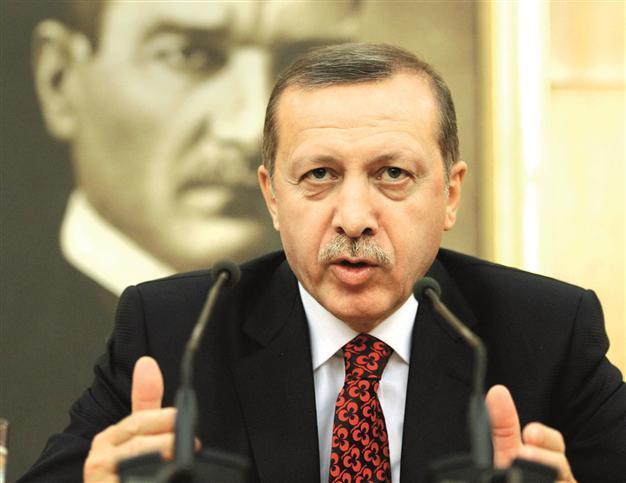Erdoğan’s distrust for al-Assad and anger for al-Maliki
DOHA - Hürriyet Daily News

The Syrian military has to return to its barracks, Turkey’s Prime Minister Recep Tayyip Erdoğan says and adds: ‘But we see no such intention [on Syria’s part].’ AA photo
Prime Minister Recep Tayyip Erdoğan was in Qatar last week for the gathering of the United Nations Conference on Trade and Development, and delivered a speech there. But it was clear from the start that the main focus of his talks in Doha, where he met with Sheikh Hamad bin Khalifa Al-Thani, the Emir of Qatar, was Syria.
It was telling, therefore, that Erdoğan’s delegation included not only Foreign Minister Ahmet Davutoğlu, but also Hakan Fidan, the head of Turkey’s National Intelligence Organization (MİT). A small group of columnists from various Turkish newspapers flew with Erdoğan to and from Qatar on his plane, and had the chance to talk to him and question him on a number of issues related to developments in the region.
Erdoğan confirmed that the main focus of the talks in Doha had been Syria, and that Turkey and Qatar, which share similar views on this issue, agreed the two countries should coordinate their efforts under the umbrella of the United Nations, the Arab League and the Organization of Islamic Cooperation to find an early resolution to the conflict.
“We do not know how far the current Annan Plan will go,” Erdoğan said, referring to the former U.N. secretary-general’s plan for Syria. “The timelines in the plan have not been upheld. At first they said 10 days, then it became 12 days.” The Syrian army had committed itself to pulling back its heavy weapons from cities and towns according to the arrangement worked out in Geneva, Erdoğan said. “But where are these to be pulled back to? It is no good to simply pull them back from the streets. They have to return to their barracks; but we see no such intention [on Syria’s part].”
Desertions from the previously 290,000-strong Syrian Army have reached 60,000, and both the Syrian opposition and the Free Syrian Army need humanitarian assistance, Erdoğan said. He was also critical of the Russian plan worked out to send 300 observers to Syria under the auspices of the U.N., indicating that this was far from sufficient and that the figure should be more like 2,000 or 3,000 for it to be meaningful and have a deterrent effect on the Syrian regime. Erdoğan nevertheless suggested that even this Russian plan appeared to indicate that Moscow had begun to distance itself from Bashar al-Assad’s regime.
Erdoğan also suggested that the latest talks between Foreign Minister Ahmet Davutoðlu and his Chinese counterpart indicated that Beijing was also moving to a position on Syria closer to Ankara’s. Erdoğan furthermore confirmed that Turkey is working actively to convince Washington to act in a more effective manner on Syria, indicating that this is not just a local matter of concern to Turkey alone, but an international matter.
He went on to confirm that Turkey also wanted to invoke Article 4 of the NATO Charter to inform Turkey’s allies of developments in Syria, so that they have a clearer picture of what is going on in that country. In a remark bound to annoy Iran, Erdoğan said that NATO was based on the principle of collective security, and that Turkey’s borders are in effect NATO’s borders. Pointing out that shots were fired recently from the Syrian side into Turkey, Erdoğan also indicated that Turkey could invoke Article 5 of the NATO charter, based on the principle that an attack on one ally is an attack on all members of the alliance. He at any rate indicated that Ankara would not stand idly by if another such violation of its borders by Syria takes place, saying Turkey would use its rights under international law to respond appropriately.
Erdoğan reserved his harshest remarks for Iraqi Prime Minister Nouri al-Maliki – a key supporter of the Damascus regime -- who recently accused Turkey of displaying enmity, not only by interfering in his country’s internal affairs but also by stoking divisions along religious sectarian lines in the region. Maliki was angered when Ankara backed Iraqi Vice President Tariq al-Hashemi, who he accuses of having formed death squads against Shiites, and who has taken refuge in Kurdish Northern Iraq. Maliki was further annoyed at Turkey for allowing al-Hashemi and Massoud Barzani, the head of the Kurdish Regional Government (KRG), to meet in Turkey recently.
“We have no intention of interfering in Iraq’s internal affairs. It was Maliki himself who asked Turkey to enter Iraq economically,” Erdoğan said. “Others come from 10,000 kilometers away and interfere in Iraq. You go and talk to them. Iran calls you and you go there. But when it comes to Turkey you make these remarks,” he said, referring to the U.S. invasion of Iraq and the close cooperation between Maliki, who is Shiite, and Iran. “It is not important what al-Maliki says. He cannot come between us and our Iraqi brothers. The Iraqi people do not share his views. Al-Maliki should note this very well. His merciless attitude is out of keeping with democracy. He refers to us stoking sectarian trouble. We have no such problem.” Erdoðan indicated that it appears that al-Maliki himself has a sectarian problem “in his own inner world.”
